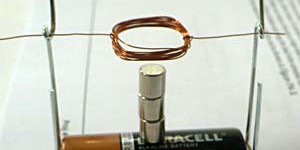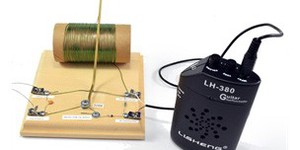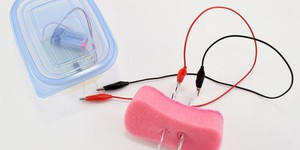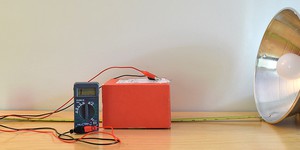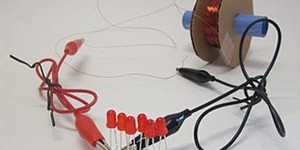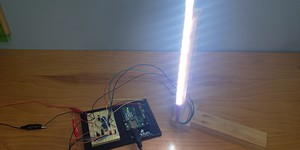Seventh Grade, Electricity & Electronics Science Projects (39 results)
Stop for a minute and try to imagine your world without electrical power and electronic gadgets.
No convenient appliances in the kitchen, no electric lights. No computers, MP3 players, television, or video games.
Your life would be completely different, wouldn't it? Electricity and electronics are so central to modern life that, paradoxically, they're easy to overlook.
|
Select a resource
Sort by
|
When you think of a motor, you may immediately think of a car, but you actually encounter other motors in your home every day. That's right, if you put on clean clothes from the washing machine, ate food from the fridge, or used a fan, you used an electric motor. In this electronics science project, you will make a simple electric motor with two magnets that "talk" to each other. As they interact, they will alternate between "liking" each other (pulling together), and "disliking" each other…
Read more
Featured
Have you heard that garlic powder is supposed to inhibit the growth of bacteria? Which do you think would make a better disinfectant: a solution of garlic powder or a solution of bleach? This project shows you a straightforward way to compare the effectiveness of different disinfectants (or other antimicrobial agents), by measuring zones of inhibition on a culture plate.
Read more
Do you want to trick friends and visitors with an amazing optical illusion? In this engineering design project you will learn how to build an infinity mirror,with built-in lights that make the mirror look like a deep tunnel with no end. But pick the mirror up and look behind it, and you will see that it is only a couple of inches thick! Read this project to find out not only how this illusion works, but how to design and build your very own infinity mirror from scratch.
Read more
New
If someone asks you to draw a picture of a doctor, lawyer, or engineer, what first pops into your mind? The race and gender of the person you imagine might be shaped by your personal life experiences, such as whether you have family members in those professions, or what representations of them you have seen on TV or online. What do you think will happen if you ask an artificial intelligence (AI) program to generate the picture instead? Will pictures generated by AI reflect the true real-world…
Read more
You may be familiar with permanent magnets—the kind that hang on a refrigerator. But did you know that other magnets, called electromagnets, can be turned on and off? When turned on, electromagnets act just like permanent magnets, but if you turn them off, their magnetic properties disappear. Electromagnets are an important part of many electronic devices, like motors, loudspeakers, and hard drives. You can create an electromagnet with a simple coil of wire and a battery. In this project,…
Read more
Have you ever wondered how a radio can grab signals that are transmitted through the air and convert them into sound? In this science project, you will build your own AM radio receiver from scratch and use it to listen to AM radio broadcasts. With your crystal radio you will be able to experiment with the circuit and the antenna to get the best reception.
Read more
Water is a valuable resource, and water shortages are a serious problem in many parts of the world. The problem can be made worse by people who waste water; for example, by watering a garden or using sprinklers on their lawn (or a farmer taking care of an entire field) when it has rained recently or the soil is already moist. How can you help conserve water and prevent such waste? One way is to build an electronic soil moisture sensor. This project will show you how to build a circuit that…
Read more
New
Have you ever wondered how your smart devices can recognize and distinguish your face from that of others? In this project, you will explore how to create and modify a facial recognition model using a type of artificial intelligence known as neural networks. This project is designed for beginners and requires little to no coding experience. Ready to give it a shot?
Read more
How does the intensity of a light source change as you move away from it? This project describes a method to verify the inverse square law: how light, sound, electrical signals, and gravity each decrease with distance from their source. It does not matter if you are talking about a lightbulb or the sun; this law still applies!
Read more
You have probably read all about forms of alternative energy like solar and wind power. But what about human power? With the aid of a coil of wire and some magnets, you can generate electricity with nothing more than a flick of your wrist. In this project, you will build a small hand-powered electrical generator that can power a series of tiny lights. Get ready to save the planet and get some exercise at the same time!
Read more
When your parents were kids, they probably wore polyester. Static cling was a major household issue! Now everybody wears cotton, which does not get static cling nearly as much. Why are some materials more susceptible to static cling than others? Investigate how well different materials produce static electricity by making a homemade electroscope and testing it out in this science project.
Read more
"Paper circuits" are a fun way to mix electronics and art by adding lights directly to a painting or drawing. These lights need a battery to power them, and typically you would use wires to connect them. In paper circuits, though, many materials can be substituted as "wire," including special types of paint, ink, and even aluminum foil. There are also different options for what type of battery you can use. Which materials do you think will work best? Try this project to find out!
Read more
Build your own strobe light using an Arduino and an LED strip. Use it to demonstrate the stroboscopic effect.
Read more
|
Explore Our Science Videos
Build a Simple Electric Motor
Marble Roller Coaster Science Project
The First Cartoon: Make Your Own Thaumatrope!


